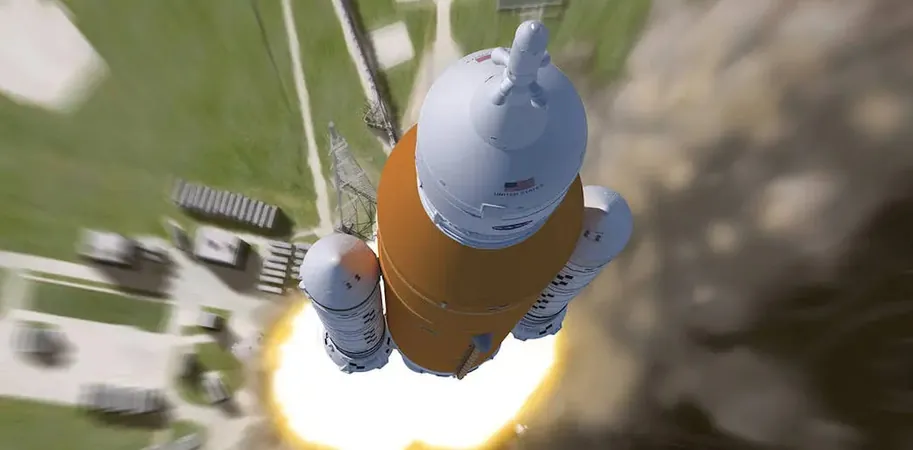
Trump’s Potential Move to Axe NASA's SLS: What It Means for Elon Musk and the Future of Space Exploration
2024-12-02
Author: Liam
Overview of the SLS and Its Importance
Donald Trump’s recent electoral win has sparked concerns and speculation about the future of NASA’s Space Launch System (SLS), a massive moon rocket central to the Artemis program aimed at returning humans to the Moon for the first time since 1972. With Artemis III, the SLS is set to launch four astronauts aboard the Orion crew capsule, which will then head to lunar orbit. In an unprecedented docking, Orion will connect with Elon Musk's Starship, enabling two astronauts to transfer to Starship for a landing on the Moon, allowing them to flag America's presence on the lunar surface once again.
Concerns Over Cancellation
Space journalist Eric Berger recently hinted at the potential cancellation of the SLS. "To be clear we are far from anything being settled, but based on what I’m hearing it seems at least 50-50 that NASA’s Space Launch System rocket will be cancelled,” he noted. If Trump chooses to follow through on this uncertainty, it raises questions about America's ambitions in an increasingly competitive space race, especially as China aggressively pushes its lunar timetable, planning to land astronauts by 2030.
Elon Musk’s Role
Elon Musk has reportedly been brought into Trump's administration to oversee potential budget cuts amounting to $2 trillion. Critics are uneasy about Musk’s influence, especially as his focus appears to pivot toward manned missions to Mars, a venture that he has ambitiously targeted for 2028. This shift could deprioritize the Moon missions that are central to NASA’s current goals, with Musk prioritizing his personal vision of colonizing Mars.
Historical Context and Delays
Historically, the Trump administration birthed the Artemis program in 2017, aiming for a robust lunar return. However, delays have pushed back the initial landing from 2023 to now autumn 2026 due to problems with spacesuit redesigns and issues surrounding the Orion spacecraft.
Operational Success of SLS
While delays plague the Artemis program, the SLS has successfully operated in its test phases, demonstrating reliability when it launched during last year's Artemis I mission. NASA has invested billions into developing the SLS and considers it crucial for sending astronauts directly to the Moon. But critics argue about its exorbitant costs, with each launch exceeding $2 billion.
The SpaceX Advantage
The climate surrounding SpaceX is starkly different, with the company enjoying remarkable successes with its Starship program. Musk's vehicle is designed to be fully reusable, potentially slashing costs and making future crewed missions more economically feasible. If the SLS were to be scrapped, Musk's Starship might serve dual purposes: launching astronauts into lunar orbit and landing them on the Moon, though it has yet to be certified for such missions.
Challenges with Replacement
Another contender in Musk's arsenal is the Falcon Heavy, but modifications would be extensive, raising doubts about delays and unforeseen complications in the timeline of Artemis missions. The complexity of NASA’s goals, including targeting diverse regions on the Moon’s surface, underscores the challenges of substituting an established rocket like the SLS with a system that remains primarily in development.
Economic Implications
With existing investments in the SLS and a pressing need to maintain the pace in the space race, completely abandoning the rocket doesn’t seem cost-effective. NASA is seeking innovative partnerships with commercial space entities to bolster future Artemis missions. The incoming administration must tread carefully, balancing cost assessments with the strategic imperatives of establishing a foothold in a new era of space exploration.
Conclusion
Ultimately, whether the focus is on lunar ambitions or accelerating a trip to Mars, the Trump administration will need to justify its decisions not only to Congress but also to a public eagerly awaiting the next giant leap for mankind—irrespective of who takes humanity’s next step into the cosmos first.









 Brasil (PT)
Brasil (PT)
 Canada (EN)
Canada (EN)
 Chile (ES)
Chile (ES)
 España (ES)
España (ES)
 France (FR)
France (FR)
 Hong Kong (EN)
Hong Kong (EN)
 Italia (IT)
Italia (IT)
 日本 (JA)
日本 (JA)
 Magyarország (HU)
Magyarország (HU)
 Norge (NO)
Norge (NO)
 Polska (PL)
Polska (PL)
 Schweiz (DE)
Schweiz (DE)
 Singapore (EN)
Singapore (EN)
 Sverige (SV)
Sverige (SV)
 Suomi (FI)
Suomi (FI)
 Türkiye (TR)
Türkiye (TR)